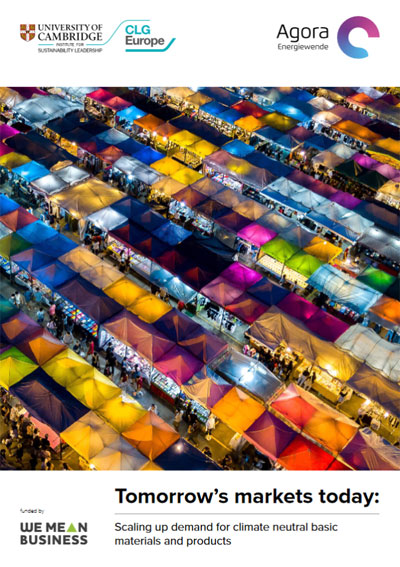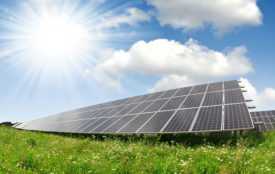How to overcome barriers to the European market for climate-friendly products
While the clean production, efficient use and recycling of basic materials are essential to make European industry climate neutral, a joint study by Agora Energiewende and CLG Europe exposes the barriers that still hold back demand for climate-friendly goods – and outlines policy priorities to scale up demand.
Demand for climate-friendly products such as recycled plastic goods or hydrogen-based steel production is weak because of a lack of market incentives. Indeed, without the right market conditions, the successful transformation to a climate-neutral industry cannot be assured. Based on in-depth interviews with leading European companies from various industrial value chains, including Unilever, Coca-Cola European Partners, Stora Enso, SSAB and Volvo, a study published today by Agora Energiewende and CLG Europe highlights different options available for decision makers to craft a well-targeted package of policies to lead the EU towards carbon neutrality by 2050. The new report called “Tomorrow’s markets today” suggests a range of actions, including embedded CO2 limits for consumer products, reporting requirements and CO2 labelling for basic materials.
“The European Union urgently needs to create the conditions necessary to accelerate the industrial transformation if it wants to become carbon-neutral by 2050,” says Patrick Graichen, Executive Director of Agora Energiewende. “And it has only one investment cycle left to do so. In that context, our study shows how crucial it is to create scalable market incentives for climate-neutral materials.”
The study outlines how policies can incentivize customers to buy and use climate-neutral materials in a way that can help industry cover the costs of decarbonising the production of basic industrial materials such as cement, iron and steel, and basic chemicals.
As Eliot Whittington, Director of CLG Europe, notes, “The EU is one of the biggest single markets in the world and a world leader in clean and efficient technology. There’s a huge opportunity to use that market pull to drive investment and innovation at a global level – accelerating the race to net zero and driving the transformation of key industrial sectors. This report shows how this opportunity can be seized through well-targeted, thought-through EU policies.”
In addition, the study reveals that the limited access to high-quality data on the carbon content of these materials is also a major concern for the companies interviewed. Yet good data is essential if downstream manufacturers and consumers are to compare the carbon content of materials accurately and thus make more climate-friendly choices.
The report emphasizes that certain policies aimed at creating demand for climate-neutral industrial products can also help to drive a range of low-carbon solutions, such as the more efficient use of carbon-intensive materials in manufacturing or an increased share of recycled materials as inputs. Indeed, the production and use of basic materials is one of the main contributors to climate change, accounting for approximately 16 percent of annual net CO2 emissions in the EU in 2017 and around 20 percent of global CO2 emissions.
Last March the European Commission presented a new Industrial Strategy and Circular Economy Action Plan as part of the European Green Deal, in which it announced a Sustainable Product Policy Initiative. The related legislative proposals are to be presented by the end of the year. With this legislative package in mind, Agora Energiewende and CLG Europe have identified three broad and mutually reinforcing policy priorities for EU policy makers to scale up market incentives for climate-neutral materials:

- Setting embedded CO2 limits on final material-rich consumer products like construction projects, vehicles and packaging.
- Developing reporting requirements and CO2 ratings labelling of key value chains and basic materials to improve data availability, quality and comparability.
- Deploying targeted lead market measures such as public procurement to promote the use of underutilised recycled materials and innovative zero-carbon materials.
The full version of „Tomorrow’s markets today“ was written by Agora Energiewende in cooperation with the Corporate Leaders Group (CLG). Published in English, the study exposes the barriers to the European market that still hold back demand for climate-friendly products. It then explores how lead markets for climate neutral materials can be created and the role EU policy can play in decarbonising heavy industry.
- „Tomorrow’s markets today: Scaling up demand for climate neutral basic materials and products“ (pdf)
What companies have to say:
“CO2 emissions from materials are significant, rising and simply can’t be ignored anymore. We hope this report encourages everyone to tackle hard-to-abate emissions from materials and invites policy makers to create policies favourable to the emergence of climate-neutral materials and products,” Peter ter Kulve, President of Home Care, Health and Wellbeing, Unilever says.
“Policy action to boost beverage packaging collection rates across Europe and drive investment in emerging recycling technologies can further enable the transition away from virgin fossil-based plastic, in support of the EU targets on emissions reduction and climate neutrality. We have an ambition to create a low carbon, circular economy with zero waste for the packaging we use, where 100 percent of our packaging is collected to be recycled or reused. We are accelerating our use of 100 percent recycled or renewable content in our plastic bottles and, alongside, supporting greater collection of plastic packaging via deposit return schemes and the scaling up of innovative technologies to recycle it,” Joe Franses, VP of Sustainability, Coca-Cola European Partners says.
- „Tomorrow’s markets today: Scaling up demand for climate neutral basic materials and products“ (pdf)








